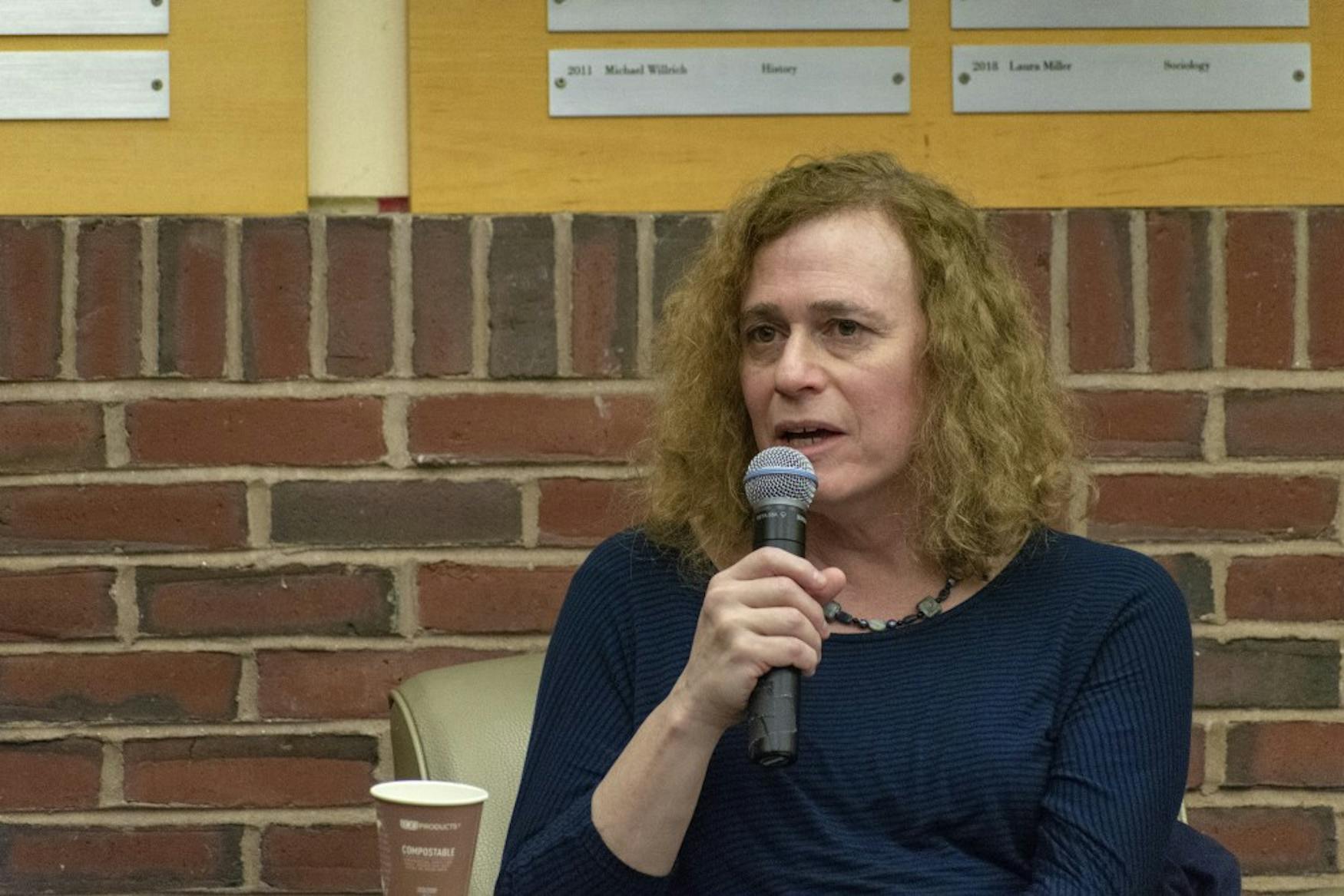Prof. discusses transgender perspectives of the Torah
Joy Ladin, a poet and the first openly transgender professor at Yeshiva University, gave a lecture about her perspective on the Torah as a transgender woman last Thursday.
This lecture was part of ’DEIS Impact, a social justice festival that took place from Feb. 3 to Feb. 9. Throughout the talk, Ladin read excerpts from her new book “The Soul of the Stranger: Reading God and Torah From a Transgender Perspective,” published by Brandeis University Press. The book is a collection of poems, literary analyses of Torah excerpts and personal anecdotes from Ladin’s life.
Ladin had been to Brandeis before for readings of her original poetry, and in 2015, the Hadassah Brandeis Institute gave her a research award to write for their Series on Jewish Women. HBI Director Lisa Fishbayn Joffe, who introduced Ladin in the lecture, explained that the Institute supports “research at the intersection of Jewish and Gender Studies.”
Ladin opened her talk with a poem unrelated to “The Soul of the Stranger” from a series she wrote about the Shekhinah — the feminine aspect of God. As a prelude to reading the poem, Ladin explained that the Shekhinah is an inspiration to Jewish feminists, but although she is “present [and] compassionate,” she is also silent. For this poem, Ladin’s goal was to give Shekhinah a “voice that didn’t have gender boundaries” by combining “certified God language” from the Book of Isaiah with a Jan. 2015 Cosmopolitan article, “ Why This Woman Is Proud to Be Known as ‘The Pageant Queen Without a Uterus.’”
The next excerpt she shared analyzed the story of Jonah and the whale. Jonah is a prophet, but instead of following the will of God and preaching to the city of Nineveh, he runs away, choosing to get on a ship and jump overboard rather than obey God’s wishes. Instead of dying, a whale swallows him and God keeps him alive. This experience leads Jonah to change his mind and fully commit to being a prophet.
Ladin linked Jonah’s reluctance to fulfill the duties of a prophet with the reluctance of transgender people to fully express themselves. Even if the townspeople of Nineveh did not retaliate violently to his announcement of God’s displeasure in them, Jonah acting as a prophet would still “disrupt the community and challenge social norms by acting in ways that mark him as different.” Ladin explained that Jonah’s self-destructive behavior and his desire to “kill [him]self for the sake of others” reflected “a psychological pattern all too familiar among transgender people.”
Throughout the lecture, Ladin spoke about how her feelings of isolation from the gender norms of society led to her developing a closer relationship with God. She said that while Jonah and the whale resonated with her when she was younger, instead of bringing her back to land, she thought God was preserving her in the depths, allowing her to remain concealed.
Another excerpt dealt with the formlessness of God. While other deities are usually given some kind of form or identity, God has no identity and takes different forms to suit the occasion, Ladin explained.
For instance, Ladin analyzed a scene from the first Book of Kings. God creates wind, earthquakes and fire, but the prophet Elijah only recognizes the true presence of God in a “still small voice” that comes after these displays of magnificence. By contrast, when God gives the 10 commandments to the Israelites, his true presence manifests itself in “fire” and “thunder.” According to Ladin, while God rejects any set identity, he accepts misrepresentation for the benefit of humanity.
Ladin related her analysis of the Torah to her rocky relationship with her son, who was 13 when she announced her transition in 2007. According to Ladin, the reason her son took her transition poorly was because in transitioning, she broke the “promise of identity” that core aspects of herself were unchanging. Ladin argued that accepting language’s limitations in describing identity is an experience that all of humanity shares, not simply transgender people.
After the lecture, there was a question and answer session. One person wondered why Ladin was not more angry with God when she was younger. She responded by saying that “God is all we’ve got … It’s like being trapped in an elevator with one other person who happens to be God. You could scream at them for twelve or thirteen years, [but] they’re all you have.”



Please note All comments are eligible for publication in The Justice.